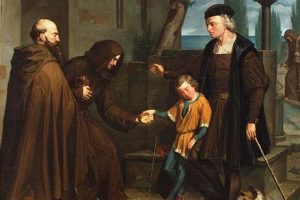Saturday of the Thirteenth Week in Ordinary Time (Independence Day)
 July 4, 2020
July 4, 202014 Then the disciples of John came to him, saying, “Why do we and the Pharisees fast, but your disciples do not fast?” 15 And Jesus said to them, “Can the wedding guests mourn as long as the bridegroom is with them? The days will come, when the bridegroom is taken away from them, and then they will fast. 16 And no one puts a piece of unshrunk cloth on an old garment, for the patch tears away from the garment, and a worse tear is made. 17 Neither is new wine put into old wineskins; if it is, the skins burst, and the wine is spilled, and the skins are destroyed; but new wine is put into fresh wineskins, and so both are preserved.”
Reflection for the day: “President Abraham Lincoln asked whether a nation ‘conceived in liberty and dedicated to the proposition that all men are created equal’ could ‘long endure’. President Lincoln’s question is no less a question for the present generation of Americans. Democracy cannot be sustained without a shared commitment to certain moral truths about the human person and human community. The basic question before a democratic society is: ‘how ought we to live together?’ In seeking an answer to this question, can society exclude moral truth and moral reasoning? Can the Biblical wisdom which played such a formative part in the very founding of your country be excluded from that debate? Would not doing so mean that America’s founding documents no longer have any defining content, but are only the formal dressing of changing opinion? Would not doing so mean that tens of millions of Americans could no longer offer the contribution of their deepest convictions to the formation of public policy? Surely it is important for America that the moral truths which make freedom possible should be passed on to each new generation. Every generation of Americans needs to know that freedom consists not in doing what we like, but in having the right to do what we ought. How appropriate is Saint Paul’s charge to Timothy! ‘Guard the rich deposit of faith with the help of the Holy Spirit who dwells within us’ (2 Tm. 1: 14). That charge speaks to parents and teachers; it speaks in a special and urgent way to you, my brother Bishops, Successors of the Apostles. Christ asks us to guard the truth because, as he promised us: ‘You will know the truth and the truth will make you free’ (Jn. 8: 32). Depositum custodi! We must guard the truth that is the condition of authentic freedom, the truth that allows freedom to be fulfilled in goodness. We must guard the deposit of divine truth handed down to us in the Church, especially in view of the challenges posed by a materialistic culture and by a permissive mentality that reduces freedom to license. But we Bishops must do more than guard this truth. We must proclaim it, in season and out of season; we must celebrate it with God’s people, in the sacraments; we must live it in charity and service; we must bear public witness to the truth that is Jesus Christ. Catholics of America! Always be guided by the truth – by the truth about God who created and redeemed us, and by the truth about the human person, made in the image and likeness of God and destined for a glorious fulfillment in the Kingdom to come. Always be convincing witnesses to the truth. ‘Stir into a flame the gift of God’ that has been bestowed upon you in Baptism. Light your nation – light the world – with the power of that flame! Amen.” — Pope St. John Paul II, October 8, 1995, Homily in Baltimore


You must be logged in to post a comment.